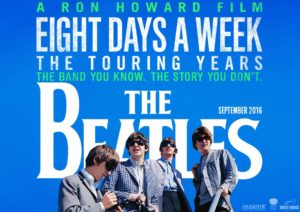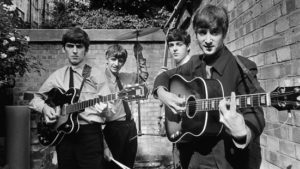

What is the name of the new Ron Howard film? The poster reads “The Beatles: Eight Days a Week—The Touring Years,” but that looks to me like three separate titles jostling for attention. Such blurred indecision is unfortunate, given that the Beatles were masters of, among other things, the crisp and crunchy title. It was no less than their songs demanded. What moviegoers should ask for, as they line up to buy tickets, is unclear. Maybe they should just stand there, numbly hold out a credit card, and say, “Help!”
The film begins in a cinema. To be exact, in the ABC in Manchester, England, on November 20, 1963, and the Beatles onstage, smacking into “She Loves You” without ado. One reason that they need no introduction, as Howard realizes, is their habit of dispensing with introductions to their songs; “She Loves You” gets a short clobber of drums, as if Ringo were tumbling downstairs in clogs, before the rest of the gang proclaims the opening chorus. The verse must wait its turn. That heavenly haste is yet more acute in “All My Loving,” which is what the Beatles kicked off with on “The Ed Sullivan Show,” in February, 1964. The avuncular host—who had once asked Walter Cronkite what he made of “those bugs, or whatever they called themselves”—promised that his audience would “twice be entertained by them.” The first thing they did was not to entertain, however, but to command: “Close your eyes, and I’ll kiss you.” Snow White never had it so good.
The tale told by “Eight Days a Week” is a familiar one: how the bugs flew, and what sort of buzz they made around the world. Beatles fans, from the maniacal to the merely devout, will be tempted to complain that they know this stuff already—everything from the Cavern Club and the hurly-burly of the Hamburg trips to the pullulating mob in Shea Stadium, in 1965, and so forth. The finale of “Eight Days a Week,” with the Beatles riffing on a rooftop, in 1969, and a wakelike blend of raw elegy and what-the-hell cheeriness filling the January air, echoes the ending of “Let It Be,” a documentary from 1970. So, what does Howard possess that earlier chroniclers don’t? Has he got juju eyeballs, monkey finger, or what?
Well, he’s got crowdsourcing. Word went out, partly on social media, that the filmmakers were hunting for fresh evidence of the Beatles on tour: private snaps and home footage, as well as professional fare. One woman had shot the concert at Candlestick Park—the band’s last stadium performance, in November, 1966—on Super 8 and kept it stashed away ever since. On top of such rare finds, Giles Martin, the son of Sir George Martin, was tasked with digitally buffing and restoring material that was known about but deemed too messy for consumption. Much of the mess was caused by human screams, which drown the flow of the music as a waterfall outroars the river that feeds it, and which meant that even the four lads themselves couldn’t always hear their own fabness. (Some of the happy howling resembles a clip from a horror film.) Ringo, interviewed for the movie, remembers a period when the only way to decipher what point they had reached in a song, enthroned as he was behind his drum kit, was to observe the motion of John’s and Paul’s backsides. One presumes that George was already bending his mind toward the East, with the result that his ass remained transcendentally calm.
There is also the issue of amplification, dating from an era—practically Mesozoic, by today’s standards—when the hi-fi was lo. The sound quality at Shea Stadium was famously feeble; Elvis Costello likens it to “a thousand transistor radios,” but Howard’s film manages to pump it up. Costello is one of a random gaggle of celebrities who have been mustered for the occasion, some for the sake of a single observation; do we really need Eddie Izzard to tell us how funny the Beatles were, when the movie teems with their larks? The most fruitful contributors are Whoopi Goldberg, who calls the band “color-less” and hails its capacity to make everyone, including the uncool, feel welcome, and the African-American historian Kitty Oliver, who expands on that theme by recalling the Gator Bowl concert in Jacksonville, Florida, on September 11, 1964—her first experience of an unsegregated audience. The Beatles scoffed at racial division not simply because it was wrong but on the more fundamental ground that, in Paul’s words, “it just seemed mad to me.”
Does this mean, though, that the Beatles were perpetually tuned in? In “Revolution in the Head” (1994), an engrossing song-by-song vade mecum to the band, Ian MacDonald writes, “It seemed to Western youth that the Beatlesknew—that they had the key to current events and were somehow orchestrating them through their records.” In tribute to that mystery, Howard stacks his film with historical happenings, but he also makes room for Paul’s admission that “we were more in our own heads,” as if the world beyond, however fractious or fascinating, could be (and sometimes had to be) screened out. To dwell in a bubble and yet be observed by millions: to grasp that paradox, in the sixties, you had to be a Beatle, or else a man on the moon.
The backbeat of the new movie is driven by an insistence that the Beatles, contrary to popular lore (and to the bragging of Rolling Stones fans), found their greatness as a live band. True, they were carted away from Candlestick Park in what appeared to be a meat wagon, sickened by life on the road, and thirsting for the haven of the studio. Nobody could quarrel with the mastery of what ensued, beginning with “Strawberry Fields Forever,” which took fifty-five hours to record. Yet there is something thrillingly open and unhermetic about the less complex creations of the early years, and there are patches of the new film that, like Richard Lester’s “A Hard Day’s Night” (1964), leave you shocked with excitement and glee; if you want to know how Uma Thurman felt, in “Pulp Fiction,” when that syringe of adrenaline was harpooned into her chest, here’s your chance. As “Eight Days a Week” springs from color to black-and-white, and as frenzied action is intercut with stills, we get a delicious sense of doubleness. The Beatles now belong to an honored past, stuck there like an obelisk, and yet here they are, alive—busting out all over, time and time again. Yeah, yeah, yeah.


